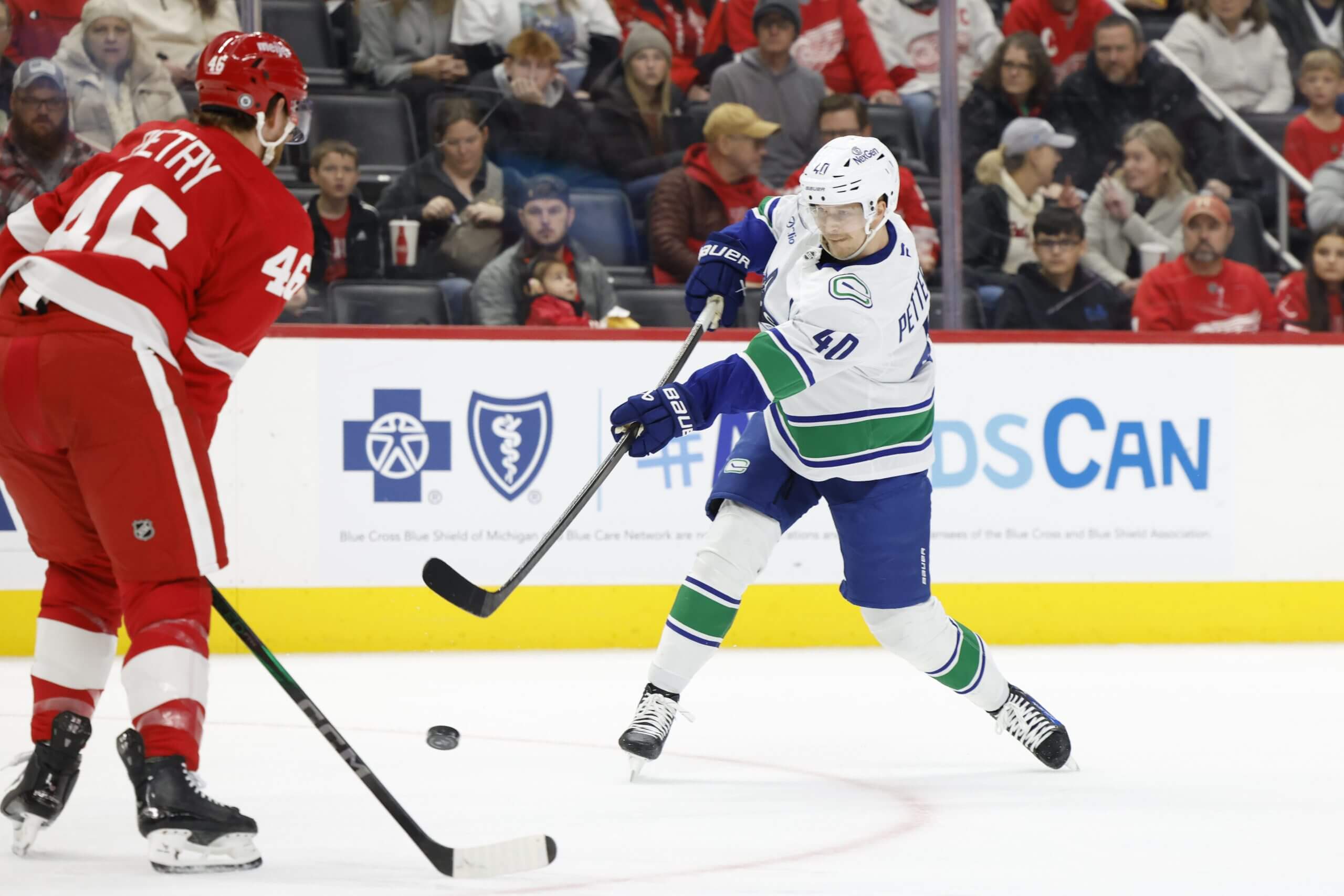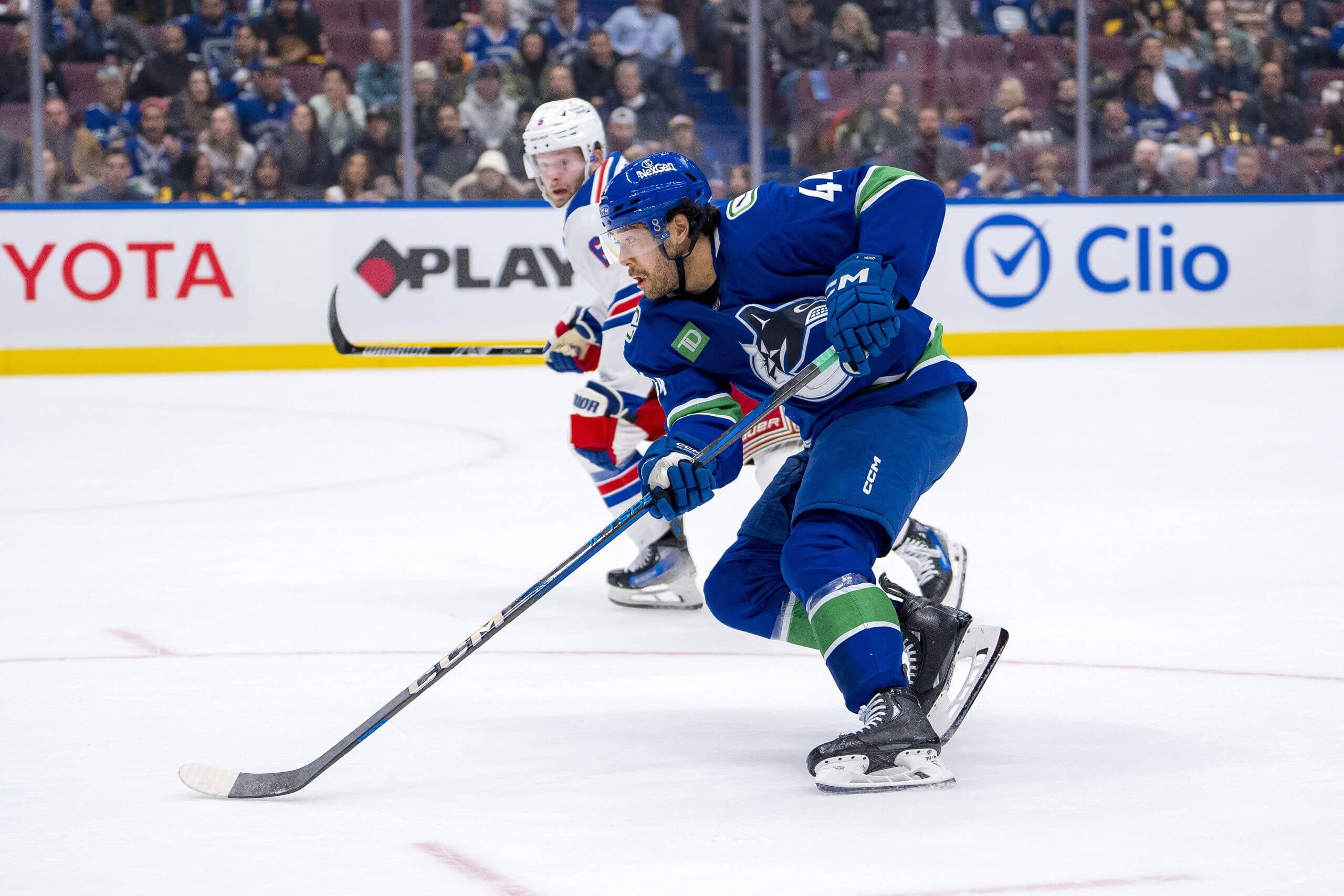Beset by injuries, absences and off-ice intrigue, the Vancouver Canucks were able to win games, accumulate points and keep pace in the Pacific Division in November.
It’s been a gritty showing, without question. Even if their overall form has remained inconsistent, especially at home — they mixed a perfect California road trip with a disappointing homestand and another exceptional road trip — there’s something to be said for the way the Canucks compete, regardless of circumstance.
With the latest six-game road trip in the books and the calendar flipped to December, let’s grade every Canucks forward’s performance through the 15-game “November” segment of the season, which for our purposes will also include their first two games of December. We intend to continue to conduct this exercise every month this season and will publish report cards for the defenders and goaltenders on Thursday.
J.T. Miller: B-
8 GP, 2-5-7
Before taking an indefinite personal leave midway through the month, Miller’s form was flagging somewhat.
There’s context here that we cannot know, and perhaps once there’s more clarity as to Miller’s availability and circumstances, we’ll view this grade differently.
For now, however, it’s worth noting Miller’s form was flagging before he took his personal leave. In his eight games last month, his only two goals were empty-netters, Vancouver was outshot and outscored with him on the ice at five-on-five, his ice time had ticked down well below his season average and he was benched for the third period of a closely contested game against the Nashville Predators two days before the Canucks announced his leave.
It’s obvious Miller hasn’t been operating at 100 percent physical capacity this season, but there could be additional factors impacting his performance that we’re unaware of at this juncture. We all know what Miller is capable of when he’s healthy and fully engaged. Hopefully we see that again soon.
Brock Boeser: B-
8 GP, 1-4-5
Boeser missed seven games because of Tanner Jeannot’s head shot on Nov. 7 and is still working to find his groove. He hasn’t scored in five games since his return, which is understandable because he’s not only shaking off injury rust but also adjusting to life without Miller. Boeser and Miller have special chemistry down low in the offensive zone. Boeser is good at sneakily finding ways to get open in the slot and Miller is gifted at making passes from below the hashmarks into that slot area.
That partially explains why it’s been a challenge for him to get quality scoring looks. Boeser has generated just five high-danger chances through eight games since Nov. 1. For context, he had 16 high-danger chances in nine games in October.
The good news is he’s still finding other ways to add value. Boeser has chipped in with some key assists and really, his production has been closer to five points in seven games since Nov. 1 instead of eight, as he only played 3:14 before leaving the game against the Los Angeles Kings. His two-way game continues to be on point as well; Vancouver has controlled 56.5 percent of expected goals during Boeser’s five-on-five shifts, which is one of the best marks among the forwards.
Elias Pettersson: A
15 GP, 6-13-19
Pettersson found significant success this month by appearing to simplify his game.
The superstar centre overcame his slow start to the season this month and began to produce offence in bunches, keying the club’s road surge in the absence of Miller (and Boeser and Filip Hronek). There’s still a bit of dynamism we’re waiting on in watching Pettersson’s game at the moment. What’s back, however, is the game-breaking discipline with which he’s gone to the net, the directness of his offensive game and the bottom-line production.
In addition to his offensive rebound this month, Pettersson is facing tougher competition in Miller’s absence and finished the month second among all Canucks forwards in five-on-five ice time. In his five-on-five minutes, the Canucks controlled play ably and outscored their opposition 12 to eight.
Given how we’ve seen Pettersson dominate in years past, we know there’s still another level for Pettersson’s game to hit. This month, however, Pettersson got back to performing at the level of an elite first-line centre.

Conor Garland: A-
15 GP, 5-10-15
The motor, grit and drive Garland has shown on a nightly basis is remarkable. He’s willing to do whatever it takes to make an impact, whether it be slick playmaking, hard forechecking, pesky penalty killing, shot-blocking or net-front goal scoring.
The latest tool he’s added to his arsenal? Chipping in with six power-play points since Nov. 1, tied with Pettersson for the team lead in that span. Garland has long been a five-on-five play-driving and point-producing ace, but he’s never been a consistent producer on the man advantage. With Miller unavailable for PP1, Garland’s stepping up and making his mark from the left half-wall as an effective Band-Aid solution.
Garland leads all Canuck forwards in averaging a whopping 20:39 per game over the last 15 games, which speaks to his role as an all-around workhorse.
Interestingly, his even-strength numbers haven’t been as dominant lately as we’re accustomed to. The Canucks are only about break-even in controlling shots and chances and have actually been outscored by a goal during Garland’s five-on-five shifts since Nov. 1. It’s completely understandable though, given the context of his monstrous workload; how short-handed the team is; and that his usual running mate, Dakota Joshua, still needs time to get fully back up to speed.
Pius Suter: A+
15 GP, 7-4-11
Suter was Vancouver’s best two-way forward last month.
The versatile forward lined up as a bottom-six centreman, a second-line centreman and a top-six winger, and excelled at whatever he was asked to accomplish. His work driving play and scoring key goals on this recent road trip, filling Miller’s sizeable shoes as the club’s second-line centre, has been especially valuable. The Canucks wouldn’t have netted nine points on their 13-day, six-game road trip if Suter hadn’t manufactured timely goals and driven a line that controlled play exceptionally well at five-on-five.
A pending unrestricted free agent after this season, Suter’s performance put him on pace for an exceptional contract year. Any team in the NHL would be better off if it could add (or keep) a player with Suter’s skill level, defensive tenacity and floor-raising versatility.
Jake DeBrusk: A+
15 GP, 11-5-16
The scouting report didn’t lie: DeBrusk is indeed a streaky scorer.
Vancouver’s marquee free-agent signing went through all nine games in October without scoring, only to turn around and pot 11 goals in 15 games once the calendar flipped. DeBrusk is tied with Sam Reinhart, Kirill Kaprizov and Mikko Rantanen for the NHL lead in goal scoring in that timeframe. He leads the Canucks in shots and high-danger chances over that span, too.
DeBrusk has done most of his damage right around the blue paint. He’s won inside position to pounce on rebounds, he’s shown silky smooth hands and patience to outwait goaltenders on other goals and he’s doing an excellent job of making himself available for tips and redirections. That net-front skill has been huge for the club’s top power-play unit. He’s also sprinkled in the occasional snipe, such as his filthy overtime winner against the San Jose Sabres.
DeBrusk’s underlying two-way profile is sparkling, with the Canucks handily controlling play and outscoring opponents 15-9 during his five-on-five minutes. The Canucks literally can’t ask for anything more from him. DeBrusk did ride a near 30 percent shooting clip over the last month, which will come back down to earth, but if he continues peppering shots and chances, the slowdown shouldn’t be too dramatic.
Dakota Joshua: N/A
10 GP, 0-2-2
Joshua was diagnosed with testicular cancer this past summer, underwent treatment to address the matter and returned to action after an extended absence to open the 2024-25 campaign.
As you’d expect, given Joshua missed training camp and a significant amount of time while recovering, the bruising Canucks forward is still finding his timing and his overall game. There are still moments he’s able to make a significant impact on the forecheck or along the wall, but that impact isn’t consistent just yet and his offensive timing and goal-scoring touch haven’t returned in full.
It’s clear from Joshua’s deployment and ice time that the Canucks are still easing him back into his usual role, and accordingly, we’ll assign him an incomplete grade for this month. What matters is he’s healthy, back on the ice and playing hockey. The rest will follow as he gets up to speed.
Teddy Blueger: B-
15 GP, 2-3-5
The offence has been harder to come by lately and his line isn’t driving play or causing fits on the forecheck as consistently as it did in October, but Blueger is still giving the Canucks rock-solid defensive play in the bottom six.
Vancouver’s surrendered just 1.98 goals against per 60 during Blueger’s five-on-five shifts since Nov. 1. Blueger’s line is struggling to generate shots, scoring chances and goals offensively, so it’s giving up slightly more than it’s creating, but coach Rick Tocchet will happily take low-event hockey right now. It fits with the Canucks’ overall posture of keeping games close and holding the fort down even if it doesn’t always look pretty.
On top of that, Blueger has continued excelling on the penalty kill.
Kiefer Sherwood: B
15 GP, 4-3-7
Kiefer Sherwood put together an exceptional two-week stretch playing on a top-six line with Pettersson and DeBrusk, but ultimately moved back down the lineup where he’s been an irascible, hard-hitting presence capable of providing some supporting offence as an against-the-grain attacker.
Sherwood has been pressed into duty of late as a penalty killer, a job he’s rarely been tasked with in his NHL career. The potential is clearly there, and Vancouver’s new higher-pressure penalty killing suits his skill set. Still, understandably, his PK contributions are something of a work in progress at this juncture.
While he may have to work on being somewhat more discerning with his shot selection to complement skilled players on the top line full-time, November was still another strong month overall for Sherwood, who has continued to cement himself as a fan favourite in the Vancouver market.

Danton Heinen: C+
15 GP, 1-5-6
Heinen has been a solid, low-maintenance bottom-six addition this season, but his play lately leaves a tad more to be desired.
Six points in 15 games doesn’t sound bad on the surface, but four of those points have been secondary assists. The 29-year-old’s five-on-five underlying numbers aren’t problematic, but they aren’t pretty, either; you’d like to see him do a bit more to drive play.
Heinen also had a couple of rough sequences on the penalty kill against Detroit — he failed to clear the puck, which preceded Alex DeBrincat’s goal, and overskated it, missing another clearance opportunity before Michael Rasmussen’s goal.
Outside of the Detroit game, however, he’s been a reliable defensive presence. He wins battles, has polished wall work and is what Tocchet often refers to as a “systems guy,” which is to say a player the coaching staff can trust to be in the right positions with and without the puck.
Aatu Räty: B-
14 GP, 2-0-2
Räty was a regular for the Canucks, appearing in 14 of their 15 games.
While he often wasn’t an impact contributor, Räty managed to post respectable underlying numbers for a fourth-line pivot and pitched in a couple of goals despite being largely snakebitten at both ends of the ice.
Perhaps most importantly, Räty managed a 55 percent faceoff win rate this month. He’s also the only Canucks centreman who has managed a faceoff win rate north of 45 percent in the seven games since Miller took his personal leave. Winning draws has been a significant sore spot for Vancouver in Miller’s absence, elevating the importance of Räty’s contributions in the circle.
Jonathan Lekkerimäki: B-
5 GP, 1-0-1
This grade might seem a bit generous, but this is where we’d remind you we’re grading relative to expectations. How much did you really expect from an undersized 20-year-old winger getting his first taste of the NHL?
Yes, there were moments when he got muscled off the puck too easily. Yes, he went quiet for many stretches offensively. Yes, he didn’t look ready for full-time NHL duties and the Canucks were wise to shuttle him back to Abbotsford.
All things considered, however, Lekkerimäki made a promising first impression. He flashed his electric shot during the first goal of his career against the New York Islanders. He seemed to scan the ice intelligently and was usually in the right spots without the puck, which was an encouraging sign of his hockey sense. He didn’t make any major defensive blunders and didn’t look out of place, even though he was quiet at times.
Lekkerimäki needs time to continue developing in the AHL, but his five-game cameo reinforced that he has some enticing long-term potential.
Arshdeep Bains: C
5 GP, 0-0-0
Tocchet values Bains’ pace and hockey sense, but it’s been a struggle for the 23-year-old Surrey native to move the needle on Vancouver’s fourth line.
He hasn’t chipped in with secondary offence, doesn’t offer penalty-killing utility and hasn’t made enough of an impact recovering pucks back on the forecheck. He doesn’t hurt the team in any way, but it doesn’t seem like he’s getting much accomplished, either.
Bains hasn’t given the coaching staff a strong enough reason to warrant staying in the lineup, which explains why he’s been sent down and why Max Sasson was next to get a turn at staking a claim on a fourth-line job.
(Top photo of Jake DeBrusk and Brock Boeser: Ezra Shaw / Getty Images)





